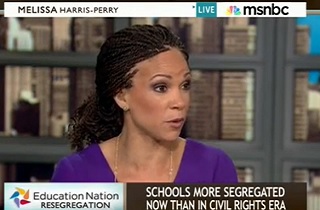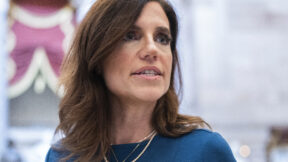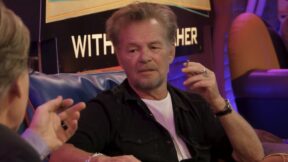Melissa Harris-Perry Jokes About Mormons ‘Changing Their Minds About Black Folks Having Souls’
 One of the peripheral aspects of the already-tangential Kierangate media kerfuffle over a Melissa Harris-Perry show segment is the host’s Twitter apology, specifically Harris-Perry’s invocation of her own Mormon background. A review of Melissa Harris-Perry‘s past commentary about Mormonism reveals an apparently genuine affection and admiration for her ancestors’ religion, as well as something of a blind spot for the Mormon Church’s history of racially discriminatory policies.
One of the peripheral aspects of the already-tangential Kierangate media kerfuffle over a Melissa Harris-Perry show segment is the host’s Twitter apology, specifically Harris-Perry’s invocation of her own Mormon background. A review of Melissa Harris-Perry‘s past commentary about Mormonism reveals an apparently genuine affection and admiration for her ancestors’ religion, as well as something of a blind spot for the Mormon Church’s history of racially discriminatory policies.
As part of her apology, Harris-Perry tweeted “As black child born into large white Mormon family I feel familiarity w/ Romney family pic & never meant to suggest otherwise,” apparently as a way to crystallize her positive intent for the segment. On MSNBC’s website, she explained “The intent of featuring the photo was to celebrate it— I often speak to the issue of the increasingly diverse American family. Whatever the intent, the segment proceeded in an unexpected way that was offensive.”
Those howling for Melissa Harris-Perry’s head might be inclined to see this as a convenient fig leaf, especially since she, herself, was not raised as a Mormon. However, Harris-Perry has spoken frequently of her Mormon roots, starting with her cable news Mormon “coming out” as fill-in host of The Rachel Maddow Show in November of 2011. She eschewed any “theological debate” about Mormonism, but spoke with pride about the church’s struggle against exclusion, and detailed her own family’s history with the LDS Church, including “a great-great-grandfather who was imprisoned for polygamy.”
“My American story is both the story of enslaved ancestors, sold on the street corner of Richmond, Virginia, on my father’s side, and of a persecuted religious minority in the American West on my mother’s side,” she concluded.
In a guest shot on TRMS earlier that year, she also used her Mormon history as a sort of defense for Anthony Weiner. Responding to Maddow’s assertion that consenting adults “have a right to be icky,” Harris-Perry agreed. “I am descended from Mormon ancestors. And I had Mormon ancestors who were imprisoned for consensual bigamy. And, you know, I‘ve always had a lot of anxiety about that because—you know, my sense is if people are adults making a choice to be in complicated marriages, you know, what does the state have to say about that?”
Watch clips of both segments below, via MSNBC:
That’s a weird position for an avowed feminist to take, defending Anthony Weiner by citing religiously indoctrinated polygamy as a stellar example of “consent,” when Mormon founder Joseph Smith had many wives who were under age 18, and as young as 14 years old.
In an interview with NPR pegged to the start of her new show, Harris-Perry again spoke about her Mormon ancestors with pride, telling David Folkenflik that “my people were Mormon pioneers,” and that “Mormon people are not elitists! Mormon people were ejected because of their identity.”
But for someone who is usually adept at identifying and calling out racism, Harris-Perry seems to have a gargantuan blind spot for the Mormons’ history of racially discriminatory policy and doctrine. Just this month, the church offered an explanation, but not an apology. for failing to grant black people equality in the church until 1978.
It’s an issue that the media seems to have agreed to ignore, as it didn’t come up much during Mitt Romney’s presidential campaigns, nor is it ever raised with Mormon Democrats like Harry Reid, but the decision to allow black men into the Mormon priesthood in 1978 isn’t treated by the church as a change, or a reversal. It is seen as a “revelation,” that the exclusion was part of God’s plan, as was the eventual inclusion.
When it came to Mitt Romney, Harris-Perry was much more likely to use the LDS church in his defense than anything else. In one March, 2012 segment, MHP used that Anthony Weiner defense again to shield Romney from his Republican primary critics, and devoted several segments of a June 2012 show to dispelling Mormon “myths.” In one of those segments, she delivered a brief history of Mormonism that abruptly leapt from 1847 to the present, just missing the 1852 announcement of the policy excluding black men of African descent from the Mormon priesthood. In the several other Mormon-centric segments of that show, she never brought the policy up, and when another panelist did, Harris-Perry glossed over it as “complicated,” while at another point, she opined that “Mormons are the black folks of the Republican Party.”
Earlier this year, though, Harris-Perry did bring up the policy on her own. During a talk about school segregation, she volunteered that “My mom, who went to Brigham Young University, likes to say that the Mormon Church changed its mind about black folks and having souls when the football team started to lose.”
Watch clips of both segments below, via MSNBC:
Harris-Perry’s feeling of connection to the Mormon Church is clearly more than a matter of convenience, as her current critics might surmise. Although it is unlikely and unwelcome to happen, it would be supremely ironic if Melissa Harris-Perry, who has been such a staunch Mormon apologist, were to be taken down for trying to celebrate one of its most famous members. Her explanation seems ridiculous at a glance, but after watching and reading the depth of Harris-Perry’s emotional connection to Mormonism. it is entirely possible that she just didn’t see that photo the way her panelists did.
Hopefully, and probably, Melissa Harris-Perry’s show will go on, and if it does, she ought to devote a few segments to examining why it is that she can so eloquently and thoroughly expose racism almost everywhere, yet seems blind (or at least mute) to its existence in her ancestral church.
This is an opinion piece. The views expressed in this article are those of just the author.
New: The Mediaite One-Sheet "Newsletter of Newsletters"
Your daily summary and analysis of what the many, many media newsletters are saying and reporting. Subscribe now!






Comments
↓ Scroll down for comments ↓